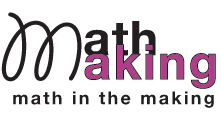Design Research
As part of the NSF-funded FRAME project (DRL-1811395), the TERC team collaborated with the New York Hall of Science (NYSCI) and the Children’s Museum of Pittsburgh (CMP) on a design-based research study to:
- Iteratively refine and test making activities that incorporate strategies for enhancing the mathematics for visitors and
- Develop a theoretical framework and design principles outlining promising approaches to enhancing the mathematics in making activities in museums.
Between 2018 and 2021, the team developed, tested, and iteratively refined four math-enhanced making activities across the two museum sites. The study was conducted in two phases, with multiple iterations and reflective meetings built into each phase. During each phase, each museum partner focused on updating and testing one activity with multi-generational visitor groups. Data collection tools were developed by the TERC team in collaboration with museum partners. Design decisions about the activities were made jointly by TERC and museum partners, building on the combined making, visitor learning, and mathematical expertise of the group.
Data collection methods included structured observations with visitor groups, researcher reflections after each observation, and post-observation visitor interviews. The primary goals of the methods were to understand the ways that visitors interacted with the updated materials, how these appeared to influence engagement with mathematical ideas and skills, and visitors’ perceptions of the mathematics embedded in the making experience. Data collection procedures were adapted during the second phase because of the global health pandemic. For example, CMP staff members created versions of their making activity for the home and gathered feedback through video recordings shared by families and virtual parent interviews. Throughout the research process, TERC and museum partners met regularly to review findings, discuss emergent design principles, and plan future research phases.
Learn more about the research findings here or see examples of the math-enhanced making activities developed through the process.
